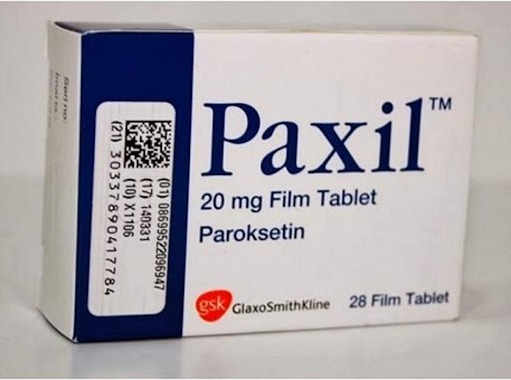Paxil, known generically as Paroxetine, is a medication belonging to the selective serotonin reuptake inhibitor (SSRI) class, primarily prescribed for the treatment of depression, anxiety disorders, and certain other psychiatric conditions. Paroxetine 20 mg represents a common dosage strength used in the management of these disorders, offering a balance between therapeutic efficacy and tolerability. This comprehensive guide aims to provide an in-depth exploration of Paroxetine 20 mg, covering its mechanism of action, therapeutic uses, recommended dosage, potential side effects, precautions, and important considerations for safe and effective use.
Understanding Paxil (Paroxetine) 20 mg: Paroxetine belongs to a class of medications known as selective serotonin reuptake inhibitors (SSRIs), which work by increasing the levels of serotonin, a neurotransmitter involved in the regulation of mood, emotions, and behavior, in the brain. By inhibiting the reuptake of serotonin into nerve cells, Paroxetine enhances serotonin activity in certain brain regions, thereby alleviating symptoms of depression and anxiety. Paroxetine 20 mg provides a moderate dosage strength suitable for achieving therapeutic efficacy in various psychiatric disorders while minimizing the risk of adverse effects.
Uses and Indications: Paroxetine 20 mg is indicated for the treatment of several psychiatric conditions, including major depressive disorder (MDD), generalized anxiety disorder (GAD), social anxiety disorder (SAD), panic disorder (PD), obsessive-compulsive disorder (OCD), and post-traumatic stress disorder (PTSD). These disorders are characterized by disturbances in mood, cognition, and behavior that significantly impair daily functioning and quality of life if left untreated. Paroxetine is also used off-label to manage symptoms of premenstrual dysphoric disorder (PMDD), eating disorders, and certain other psychiatric conditions, either as monotherapy or adjunctive therapy in combination with other medications or psychotherapy.
Efficacy and Benefits: Clinical studies have demonstrated the efficacy of Paroxetine 20 mg in reducing symptoms of depression, anxiety, and other psychiatric disorders, leading to improved functional outcomes and quality of life in affected individuals. The moderate dosage strength offers a balance between therapeutic efficacy and tolerability, allowing for adequate symptom control while minimizing the risk of adverse effects commonly associated with higher doses or other antidepressant medications. Paroxetine typically begins to take effect within 1 to 2 weeks after initiation of therapy, with optimal therapeutic benefits observed with continued use over several weeks to months. By providing relief from debilitating symptoms, Paroxetine enhances the quality of life for individuals affected by psychiatric disorders.
Dosage and Administration: The recommended dosage of Paroxetine 20 mg is determined based on the specific psychiatric condition being treated, individual response, and tolerability. It is typically administered orally once daily in the morning, with or without food, to maintain therapeutic blood levels and provide sustained symptom control throughout the day. The dosage may be titrated gradually based on clinical response and tolerance, with regular monitoring by a healthcare professional to optimize therapeutic outcomes and minimize the risk of adverse effects. It is important to follow the prescribed dosage and administration instructions provided by the healthcare provider to achieve optimal treatment outcomes while reducing the risk of medication misuse or overuse.
Side Effects and Precautions: While Paroxetine is generally well-tolerated, it can cause certain side effects, especially at higher dosage strengths such as Paroxetine 20 mg. Common side effects include nausea, dizziness, drowsiness, insomnia, and sexual dysfunction. These effects are usually mild to moderate in intensity and transient, resolving spontaneously with continued use or dose adjustment. However, more serious adverse reactions such as serotonin syndrome, suicidal ideation, and withdrawal symptoms are rare but require immediate medical attention. It is important to use Paroxetine with caution in individuals with certain pre-existing medical conditions such as liver or kidney impairment, bipolar disorder, and history of substance abuse. Additionally, Paroxetine may interact with certain medications, including monoamine oxidase inhibitors (MAOIs), serotonin-norepinephrine reuptake inhibitors (SNRIs), and tricyclic antidepressants (TCAs), leading to potentially serious drug interactions and adverse effects.
Conclusion: Paroxetine 20 mg is a valuable medication for the treatment of depression, anxiety disorders, and certain other psychiatric conditions, providing significant relief from symptoms of mood disturbances, anxiety, and compulsive behaviors. With its moderate dosage strength and selective serotonin reuptake inhibition, Paroxetine offers effective symptom control while minimizing the risk of adverse effects commonly associated with traditional antidepressant medications. However, it is important to use Paroxetine responsibly, under the guidance of a healthcare professional, and to be aware of potential side effects, precautions, and drug interactions. By understanding the therapeutic uses, dosage recommendations, and safety considerations associated with Paroxetine 20 mg, individuals with psychiatric disorders can make informed decisions regarding their treatment options and achieve better management of their symptoms.





Reviews
There are no reviews yet.